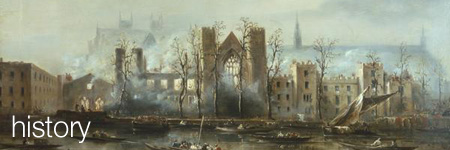
Cornhill
City (EC3) Stow says: "It [Cornhill] was named of a cornmarket time out of mind there holden." Cornhill has been the site of the Merchants' Exchange for nearly three centuries. At No. 15, Cornhill, is Birch's, the cook and confectioner's, probably the oldest shop of its class in the metropolis. This business was established in the reign of George I by a Mr. Horton, who was succeeded by Mr. Lucas Birch, who was not only a famous pastry-cook, but a dramatist of repute. For some ten years Daniel Defoe kept a hosier's shop here-in Freeman's Court (not now in existence) . On the charge of writing a "scandalous and seditious pamphlet" entitled The Shortest Way with Dissenters he was pilloried before the Royal Exchange in 1703.
At 65, Cornhill, in 1860, Smith & Elder commenced the Cornhill Magazine, with Thackeray as editor. Of this house, Thackeray wrote to a friend: "Our storehouse being in Cornhill, we date and name our magazine from its place of publication." Where No. 41 now stands was born Thomas Gray, author of what many think the finest poem in the language, the famous "Elegy written in a Country Churchyard."